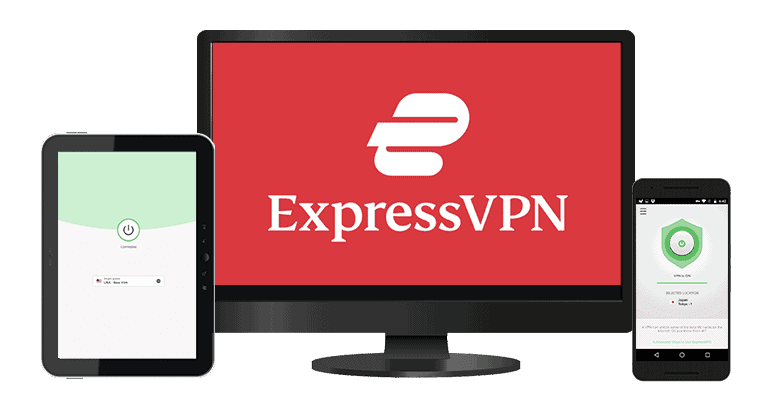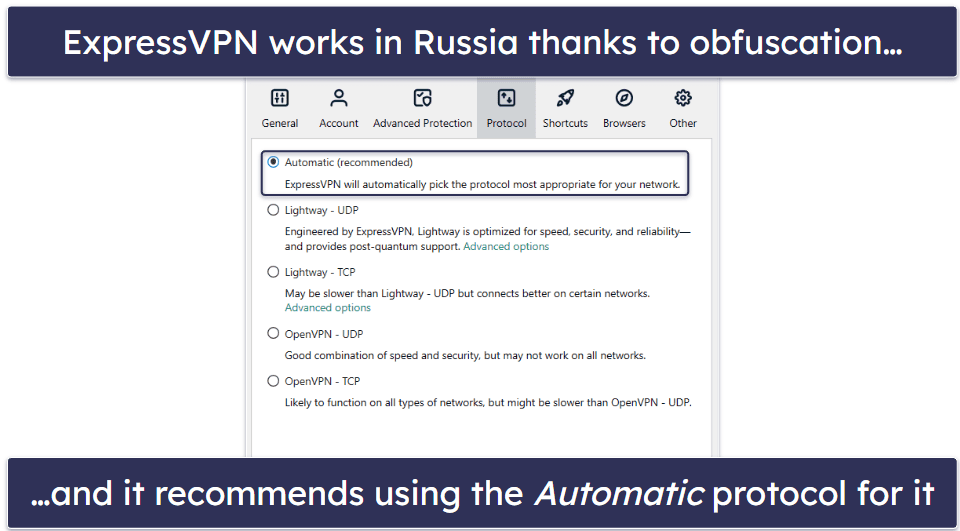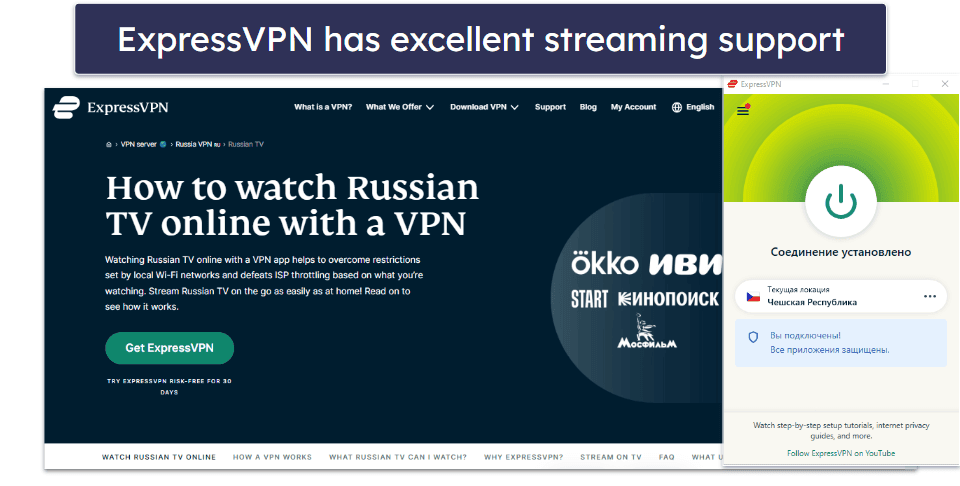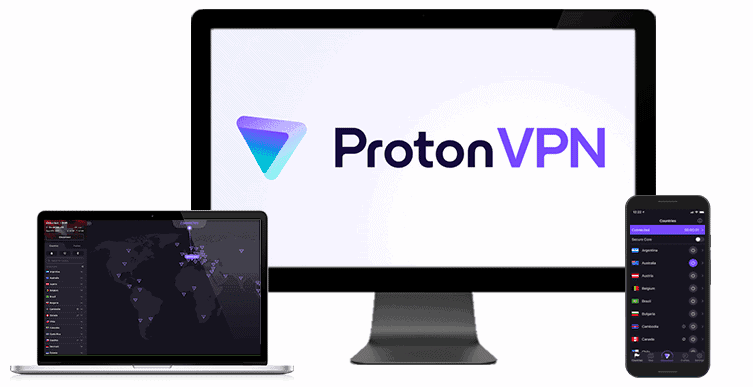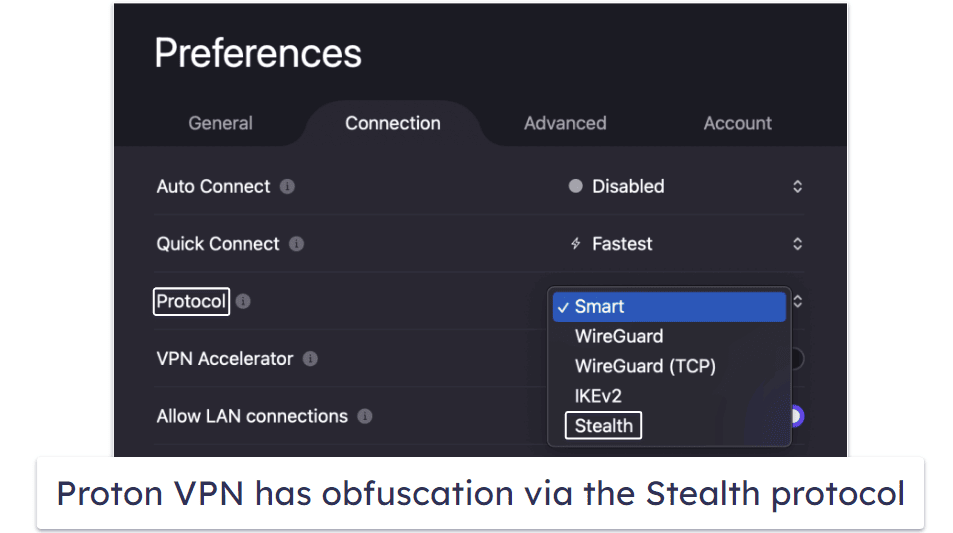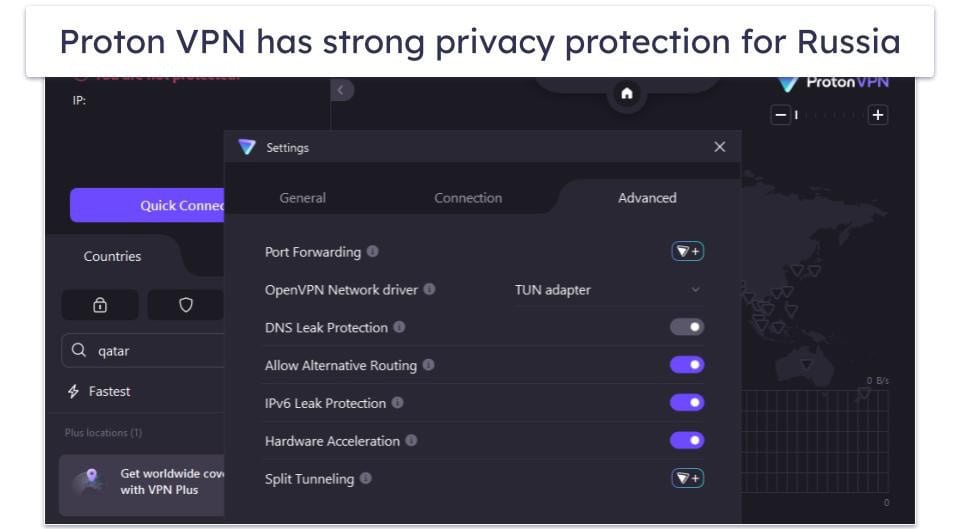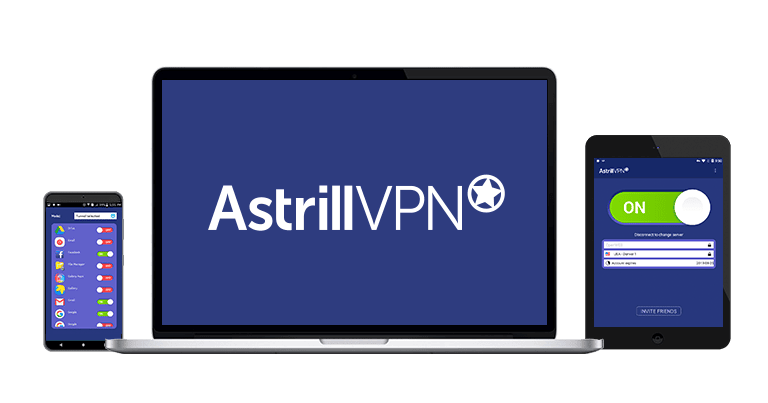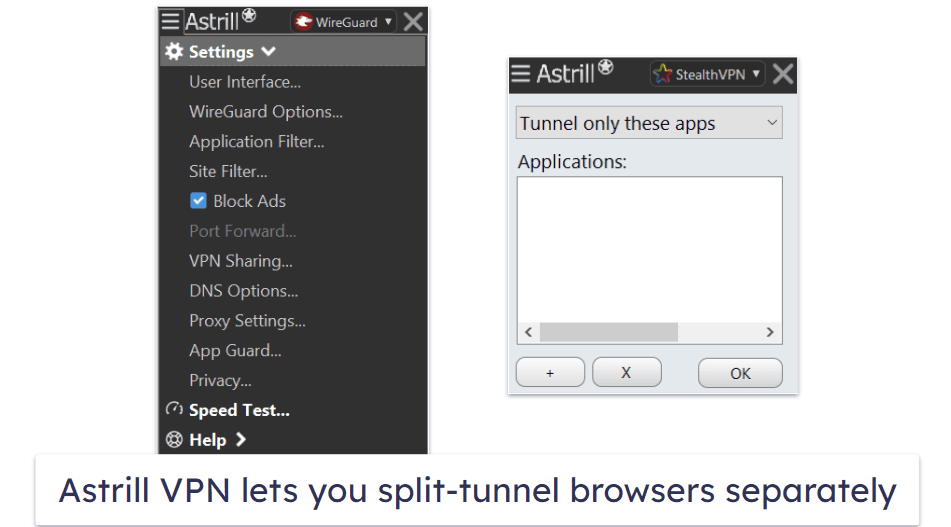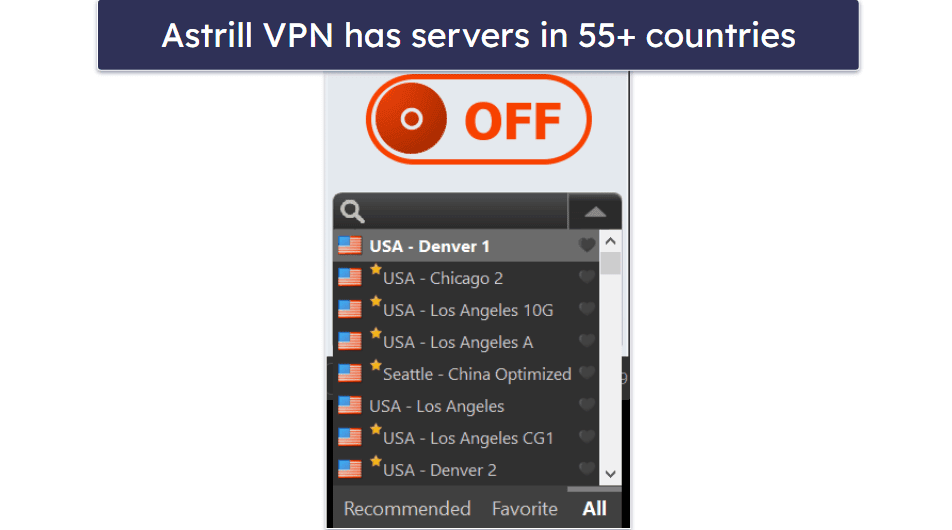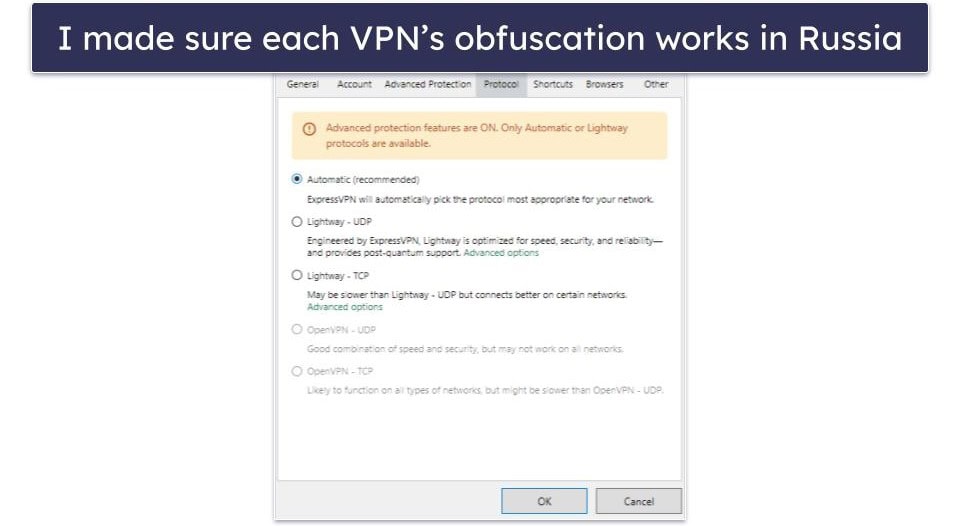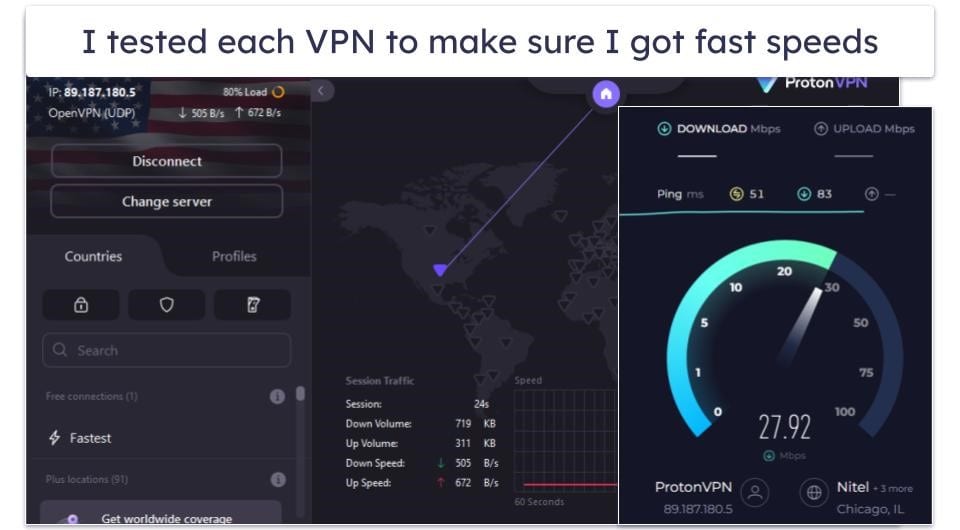
Penka Hristovska
Updated on: October 29, 2024
Fact-checked by Katarina Glamoslija
Short on time? Here’s the best free VPN for Russia in 2024:
-
🥇 ExpressVPN
. It’s not free, but it backs all plans with a 30-day money-back guarantee. Works in Russia 100% of the time thanks to its sophisticated obfuscation tools, has advanced security features, and maintains the fastest speeds on the market. It also has a large server network for connecting to servers in countries near Russia.
Most VPNs — both free and paid — don’t work in Russia. Russia has strict censorship and data laws in place that the majority of VPNs refuse to follow because doing so might put their users’ privacy in jeopardy.
Plus, Russia uses advanced strategies to block VPNs that don’t conform with its data retention philosophy. ISPs use real-time detection tools, like deep packet inspection, to block VPN IP addresses, many VPN websites, ports associated with VPNs, and more.
But I still wanted to find out which free VPNs are good for Russia — if any. I asked my colleague in Russia to test the top free VPNs on the market, and he found only one 100% free VPN that he was able to download and use from his location, ProtonVPN.
Since free VPNs come with limitations, my advice is to get a paid VPN for Russia. Out of the few VPNs that work in Russia, my favorite is ExpressVPN. It consistently works in Russia, as my colleague reported, is the fastest VPN on the market and offers excellent security and privacy. Editors’ Note: ExpressVPN and this site are in the same ownership group.
Quick Summary of the Best Free VPNs for Russia
DISCLAIMER: It’s essential to familiarize yourself with the local laws regarding VPNs use. Using a VPN in ways not in line with Russian regulations could lead to penalties or legal consequences. Neither I nor anyone at SafetyDetectives endorse or promote using VPNs for activities against Russian law and advise you to always check local laws and regulations before using a VPN in Russia.
🥇1. ExpressVPN — Best Overall VPN for Russia in 2024
ExpressVPN is, without a doubt, the best overall VPN for Russia. It’s very fast and secure, and my colleague in Russia confirmed it works there after testing it multiple times over the course of a couple of weeks. Although it’s not free, it has a 30-day money-back guarantee on all plans, allowing you to test it risk-free.
ExpressVPN works so well in Russia because of its obfuscation, which is automatically included on all servers and protocols. Obfuscation disguises your VPN traffic as standard internet traffic to bypass VPN blocks and network restrictions. The obfuscation works against Russia’s internet censorship, including keyword and web filters, so you can access websites from any country you choose. For best results, the VPN recommends using the Automatic protocol setting in Russia.
The VPN also has great resources on its website for connecting successfully in Russia, including 24/7 live chat with knowledgeable support reps, as well as connection and troubleshooting guides for restrictive countries like Russia.
It also lists recommended countries to connect to when using the VPN in Russia. There are 5 locations, including Sweden, the Netherlands (Rotterdam location), the UK (Docklands location), Switzerland, and Germany (Frankfurt 1 location). These locations are optimized to work best with Russian connections.
If you can’t access the official ExpressVPN website from Russia, the VPN offers mirrored links to its site. These are unique URLs that won’t trigger Russia’s VPN block, so you can sign up and download the app while in Russia. They typically work since they’re not posted publicly and change frequently. To get one, you just have to ask customer support.
ExpressVPN has excellent streaming and torrenting support, as it works with 100+ streaming apps, including Russian ones like KinoPoisk, Okko, and Ivi.ru (all confirmed by our tester in Russia). I also like that ExpressVPN allows P2P traffic on all of its servers in 105 countries.
It’s also very good at keeping your data safe. It comes with full leak protection against DNS, WebRTC, and IPv6 leaks and an audited no-logs policy, which means your online activities, real IP address, and other sensitive information won’t be leaked to Russian ISPs or authorities. It also has RAM-only servers that don’t store any data to the hard drive.
The provider’s apps are very user-friendly. I’m a big fan of the Shortcuts feature, which allows you to create 1-click shortcuts for your favorite apps and sites that show up on your screen after you connect to a VPN server.
ExpressVPN’s plans start at £4.25 / month. All subscriptions are backed by a 30-day money-back guarantee. If you decide to get one of its plans, ExpressVPN offers several payment methods in Russia, including Bitcoin, YooMoney (Yandex), and WebMoney. Qiwi Wallet is no longer available, but all other payment methods have been confirmed by my colleague in Russia.
Note that you may need a Russian-sanction VPN, like Kaspersky’s free VPN, to initially launch the ExpressVPN app. Kaspersky VPN is a government-approved VPN in Russia that complies with the government’s censorship and data requests.
Bottom Line:
ExpressVPN is the best VPN for Russia because it’s one of the few VPNs that works reliably in Russia thanks to its obfuscation that bypasses DPI. It also comes with mirrored links, top-notch customer support and guides for connecting in Russia, and strong overall performance. There’s no free plan, but every plan is backed with a 30-day money-back guarantee.
Read the full ExpressVPN review
🥈2. Proton VPN — Best Free Plan for Russia With Unlimited Data
Proton VPN is one of the only VPNs whose free plan works in Russia and includes unlimited data. This is great because there’s no cap on how much internet data you can use on a daily or monthly basis for all online activities in Russia.
Proton VPN works well in Russia because of its advanced obfuscation through the Stealth protocol. This protocol is available on iOS, Android, and Mac, but not Windows. The good news is that it’s super easy to enable — just go to Settings, select Protocol, and choose Stealth. That said, I do prefer ExpressVPN’s obfuscation since it’s automatic on all servers and protocols and works with Windows.
The provider’s free plan gives you access to servers in 5 countries — the US, the Netherlands, Romania, Poland, and Japan. Proton VPN has servers in Russia, but to be able to connect to one of them, you’ll need to use the paid version.
The VPN has good customer support for getting troubleshooting help in Russia. It has an email ticket support system as well as detailed guides on its website for using the VPN. However, I don’t like that you have to be a paying customer to access live chat support, and it doesn’t have any specific articles for connecting in restrictive countries like ExpressVPN.
The free plan has advanced security features, too, including full leak protection, a verified no-logs policy, and perfect forward secrecy, which prevents hackers from accessing past or future data if they decrypt any current data. It also has full-disk encryption, which makes sure all data on a server is safe even if it’s compromised.
The free plan doesn’t allow streaming, but the paid plan works with 30+ streaming apps. Also, only the premium plan supports torrenting and that’s only in 15+ countries, which is a lot fewer compared to ExpressVPN’s support across all of its 105.
Proton VPN’s plans are reasonably priced at £2.31 / month, and all subscriptions have a prorated 30-day money-back guarantee. If you decide to get Proton VPN’s paid plan, which includes access to all features and servers in 112 countries, my colleague confirmed the only way to pay for a subscription from Russia is with UnionPay. ExpressVPN offers more payment options.
Bottom Line:
Proton VPN’s free plan works well in Russia and has unlimited data, allowing you to browse the web without any bandwidth restrictions. The free plan includes strong obfuscation, advanced security features like full leak protection and gives you access to servers in 5 countries. Its customer support is also pretty good, but live chat isn’t available on the free plan. All of its premium plans have a 30-day money-back guarantee.
Read the full Proton VPN review
🥉3. Astrill VPN — Great Security Features & Good For VPN Beginners
Astrill VPN works reliably in Russia thanks to its StealthVPN protocol, which hides your traffic from the Russian government and your ISP. It also uses a cool Smart Mode that optimizes your speeds through regional IP addresses and helps avoid IP blocking.
It comes with beginner-friendly apps that consistently work in Russia. It’s very easy to find and connect to a server in any of its apps — it only takes a couple of clicks. Plus, the apps allow you to send your connection through a specific browser if you use one for accessing the free internet in Russia.
Astrill VPN offers a 7-day free trial for those that want to give the VPN a go. The provider doesn’t have a free plan like Proton VPN, and unfortunately, there’s no money-back guarantee like with ExpressVPN’s plans or Proton VPN’s paid plans.
Astrill VPN comes with full leak protection against WebRTC, DNS, and IPV6 leaks. I ran 10+ leak tests and I never experienced any leaks. I also I like how it comes with a multi-hop feature that routes your traffic through 2 servers for an extra layer of security.
The VPN has servers in 58 countries, including plenty of locations that are near Russia, such as Finland, Ukraine, Sweden, and Japan, which is great for getting the best speeds possible. My colleague in Russia confirmed that he was able to repeatedly connect to them and browse the web from Russia without any issues.
Astrill VPN also lets you route all of your traffic through port 443 when you use the OpenVPN protocol. This is a great alternative if StealthVPN doesn’t work since HTTPS websites also use this port, so it’s highly unlikely that Russia would ever block this port from being used.
Its customer support is also really good. There’s live chat if you need immediate help connecting in Russia, and the website includes video tutorials, setup guides, FAQs, and more to answer any questions you have about using the VPN in Russia.
Astrill VPN’s plans start at £9.67 / month. My Russian colleague said the only 2 payment methods available to him in Russia were UnionPay and cryptocurrency. If you prefer another payment method, check out ExpressVPN.
Bottom Line:
Astrill VPN is a secure and beginner-friendly VPN that works really well in Russia with its StealthVPN protocol. Its apps are intuitive, so you’ll have no problem finding and connecting to a server while in Russia, it has advanced security features for private browsing, it lets you customize your connections through port 443, and it has great customer support with live chat. There’s no free plan or money-back guarantee, but you get a 7-day free trial.
Read the full Astrill VPN review
Quick Comparison Table
Editors’ Note: ExpressVPN and this site are in the same ownership group.
Testing Methodology: Comparison & Ranking Criteria
Finding a good free VPN for Russia isn’t easy, so I relied on our proven testing methodology to help me find as many reliable options as possible. Here’s the criteria I used to make my list:
- I looked for a VPN that works in Russia. A good VPN should be able to get around Russia’s censorship and allow you to browse the open internet. I checked that each VPN’s obfuscation worked well for Russia. I also contacted the support teams for each VPN on this list, and they all confirmed that their respective VPNs work in Russia.
- I opted for a VPN with strong security features. All of the VPNs on this list come with industry-standard security features like 256-bit AES encryption, a no-logs policy, and a kill switch that disconnects you from the internet if your VPN connection drops.
- I tested each VPN for fast speeds. Free VPNs are usually slower than premium VPNs because their small server networks can lead to overcrowded servers. But good VPNs still maintain fast speeds. My top pick, ExpressVPN, had the fastest speeds in my tests.
- I searched for a VPN with high data caps. Many free VPNs limit the amount of data you can use on a daily and monthly basis, so I recommend picking one that allows at least 5 GB of data per month.
- I only selected VPNs that offer reasonable prices and excellent value. The paid packages should offer extensive server networks, superb streaming support, and refund guarantees.
Risks & Disadvantages of Using a Free VPN for Russia
- Weak security — Free VPNs often lack important security features, such as 256-bit AES encryption and a kill switch. The VPNs on my list all have these essential features and more.
- Blacklisted servers — Many free VPNs don’t work in Russia because their servers get blacklisted. Premium VPNs like ExpressVPN continually refresh their server IPs or use different ports to avoid blacklisting, maintaining reliable access to the internet.
- Data caps — Free VPNs often have data limits, restricting how much you can download or stream in a month or a week. This is super frustrating and easy to use up if you’re not careful. On the other hand, the VPNs I discuss here offer unlimited bandwidth.
- Annoying ads — To make money, some free VPNs show you lots of ads, which is incredibly annoying. Premium VPNs don’t typically show ads.
- Privacy issues — Some free VPNs make money by logging all your online activity and selling your data to third parties. Proton VPN, for example, maintains a strict no-logs policy and publishes regular transparency reports to show its commitment to user privacy.
- Bad streaming & torrenting support — Free VPNs don’t usually support streaming and torrenting. Some free VPNs might work unreliably with streaming services, while some don’t work at all.
- Limited access to servers — With a free VPN, you’re often limited to a small number of servers, which may not always be in your desired location. Premium VPNs offer a wide range of global servers, giving you better chances to connect to a nearby server for the best speeds and stable connections.
Free vs. Paid VPNs for Russia
The free VPNs I’ve reviewed all have good security features like 256-bit AES encryption, a kill switch, and a strict no-logs policy, which are fundamental for maintaining your privacy online. Some even go a step further by offering more advanced security features like leak protection, RAM-only servers, and perfect forward secrecy.
However, most free VPNs don’t have a lot of important features that paid VPNs have. They often come with throttled speeds, data caps, and inadequate support for streaming and torrenting, which can be pretty annoying. Furthermore, a large number of free VPNs don’t work in Russia due to network restrictions and VPN blocking.
Upgrading to a premium VPN is typically the way to go if you need a VPN for Russia. They have much better speeds, better security, and allow access to their whole server networks, which are usually much bigger than those of free VPNs. Moreover, most premium VPNs include a money-back guarantee, giving you a risk-free opportunity to test their service.
Free VPNs for Russia to Avoid
- Phone Guardian. Phone Guardian doesn’t work like a regular VPN. It doesn’t change your IP address or hide your location, it just encrypts some of your data. It doesn’t have security features or any other important features that you’d get with a proper VPN.
- Hoxx VPN. HoxxVPN collects a lot of sensitive information, including all your online activities, your device information, and your location. I also don’t like that it keeps that data after you delete your account.
- Hola VPN. Hola VPN is a peer-to-peer VPN, so it lets you use another user’s IP address while someone else uses yours. This is extremely dangerous because someone could do seriously illegal things online while using your IP address
- TuxlerVPN. TuxlerVPN’s service is more-less the same as HolaVPN’s — very risky and dangerous. Also, it logs your online activities, browser data, and contact information. Then it sells all of that data to third parties.
- TouchVPN. TouchVPN has an impressively large server network for a free VPN, spanning 80+ countries. Sadly, it logs your IP address and all your online activity.
Do Free VPNs Work in Russia?
Most VPNs, let alone free VPNs, are generally ineffective in Russia. This is because the country has censorship and data sharing laws, may sometimes restrict VPN traffic, and has banned a couple of VPNs from being able to operate in the country (such as NordVPN). Free VPNs rarely have the means to make sure their product works well in restrictive countries like Russia.
The core issue with free (and even paid) VPNs that do work in Russia is that they either collect logs and sell that data to third parties, including Russian agencies, or they have no-logs policies but have agreed to share the little data they do collect (usually to keep in touch with you and update your payment when necessary) with the Russian government if necessary.
Proton VPN’s is the only free VPN plan out of the top free VPNs on the market that works in Russia and won’t share your data with the Russian government. My colleague in Russia tested all top free VPNs, and it’s the only one that worked for him.
The VPN offers great security and privacy and won’t share data with the Russian government thanks to its independently audited no-logs policy. It comes with other perks like unlimited bandwidth and decent speeds for all online activities, too.
But as a free VPN, it has its limitations. it doesn’t support streaming or torrenting, you only get 1 connection, and it includes access to servers in just 5+ countries.
This is why I prefer paid VPNs that work in Russia (including Proton VPN’s paid version). They offer a lot more value, including unlimited data, multiple connections, access to a large server network, very fast speed, excellent security and privacy, extra features like an ad blocker, and streaming, gaming, and P2P support. Plus, the VPNs I recommend that work in Russia offer a money-back guarantee or a free trial, so you can try their service risk-free.
Is It Safe to Use Kaspersky Free VPN in Russia?
Kaspersky VPN’s free plan is decent for browsing, but whether you should seriously consider using it in Russia depends on what you need the VPN for.
First thing first — the free Kaspersky VPN does work in Russia. My colleague in Russia tested it several times over a period of 3–4 weeks and said he never had any issue accessing the Kaspersky site, downloading the VPN app onto his device, or connecting to a server.
The free plan comes with some security features, but unlike the VPNs I recommend here, it’s pretty limited. You don’t get a kill switch, which is a standard security feature, but it does follow a no-logs policy, which, unfortunately, hasn’t been independently audited, making it harder to trust it.
Plus, there’s a pretty big caveat when it comes to using the VPN in Russia — as a Russia-sanctioned VPN, Kaspersky VPN might share user data (no matter how little it logs) with Russian authorities, and this is something the VPN has publicly stated.
Being an authorized VPN in Russia also means that Kaspersky VPN, whether its the paid or free version, complies with the government censorship request. This means that when you’re connected to Kaspersky, you’ll only be able to visit sites that the Russian government allows.
Personally, the only time I’d use Kapersky’s free VPN in Russia is if I needed a helper VPN to access my primary VPN app. Overall, I wouldn’t trust it to keep information about my online activities private and secure from government agencies in Russia, especially if dealing with sensitive data (like journalists or NGOs do).
Why Does Russia Block Some VPNs?
Russia blocks certain VPNs as part of its broader internet censorship efforts.
The primary reason for this censorship is to control and restrict access to information and content that the government deems inappropriate or a threat to national security and public order. This includes political content, material that criticizes the government, and sites promoting certain social movements or ideologies.
Specifically, Russia has banned access to numerous websites and apps, including prominent social media platforms, like Facebook and Instagram, messaging apps like WhatsApp, and news sites that are considered to be spreading information counter to the state’s official narrative or promoting unsanctioned public gatherings and protests.
Since VPNs change your IP address, making it appear as if you were accessing the web from a different location, they may enable you to visit sites and watch content that you typically won’t be able to do with a Russian IP address. This is why Russia only sanctions certain VPNs to operate in the country, more specifically, VPNs that agree to comply with the government’s censorship and to share data with Russian authorities.
The Russian government has banned several VPN services that refused to do so and a lot of top VPN providers have removed their servers from the country. The VPNs on this list don’t share data with the government or follow its censorship rules.
Why You Should Use a VPN in Russia in 2024
Enhancing Online Privacy
VPNs encrypt your online traffic, making it unreadable to third parties, including the Russian government. This means all of your online activities will remain hidden from your Russian ISP and any government surveillance, which is especially important for journalists, activists, or anyone concerned about their online privacy in Russia.
Secure Communication
In Russia, strict regulations and the government’s stance on cracking down on opinions that counter the main narrative, it can be pretty intimidating for anyone to say what they think. A VPN allows you to communicate anonymously since it hides your IP address (which reveals your general location) and scrambles your online data, making it very hard for anyone to track your activities back to you. Note that neither I nor anyone at SafetyDetectives condone using a VPN to break Russian law.
Protect Your Data on Public Wi-Fi
Public Wi-Fi networks are one of the easiest targets for hackers. In Russia, public networks may also make it easier for Russia’s monitors to spy on your activities, and maybe break into your device and steal information. Since VPNs encrypt your traffic, they significantly reduce the risk of this happening to you.
Download Torrents & Stream Anonymously
Due to the VPN’s encryption and the fact that it assigns you a different IP address, you can anonymously torrent P2P files and stream your favorite content in Russia.
Frequently Asked Questions
What’s the best free VPN for Russia?
ExpressVPN is my top pick for Russia. It comes with advanced security features and obfuscation that reliably lets you browse the open web in Russia. It also has user-friendly apps and excellent streaming support for sites like KinoPoisk and Ivi.ru. You can try it risk-free via its 30-day money-back guarantee.
If you insist on a truly free VPN, I recommend Proton VPN’s free plan. It reliably works in Russia, as confirmed by my Russian colleague, allows unlimited bandwidth, has decent speeds, and gives you access to servers in 5 countries.
How do I browse the web from Russia with a free VPN?
Surfing web content from Russia with a VPN requires only 3 steps:
- Step 1: Get a free VPN that works reliably in Russia. Not a lot of VPNs — let alone free ones — work in Russia, but the 3 options on my list are great for Russia.
- Step 2: Download and install the VPN. The process shouldn’t take longer than 2 minutes.
- Step 3: Open the app and connect to a server. That’s it! You can now securely browse, stream, torrent, and game in Russia.
Is using a VPN legal in Russia?
Technically, yes, but Russia’s vague digital laws give the government wide authority to restrict the use of VPNs. Only government-approved VPNs may operate in Russia, and this usually comes with the condition of being subject to monitoring.
It’s theoretically possible to be fined for using a banned VPN in Russia, although in my research, I didn’t find any reports of foreigners in Russia being punished for using non-government-approved VPNs. That said, I recommend informing yourself about the current laws — at SafetyDetectives, we don’t condone breaking Russian law.
Which VPN has Russian servers?
Proton VPN is one of the few VPNs that still has physical servers in Russia. It also comes with advanced security features, a free plan that has unlimited data, and apps with user-friendly interfaces.



